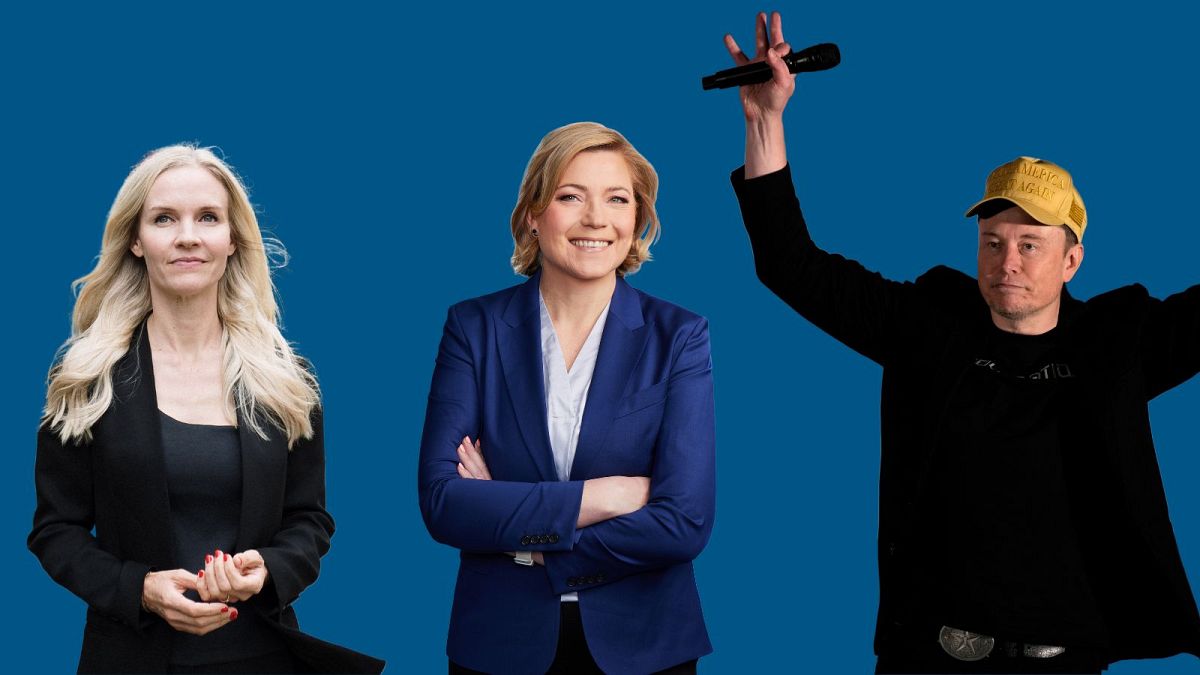Tech
Tech policy in 2025 – 14 movers and shakers to watch for in Europe

If 2023 and 2024 saw serial EU digital rules developed, 2025 clearly promises to be the year of enforcement. The EU election last June reshuffled the Brussels political landscape, and while some key figures of influence remain in place, others have emerged.
While it is impossible to predict the year ahead, Euronews presents those who are likely to shape the digital agenda this year and who you should keep an eye on:
The CEOs/platforms
Elon Musk, CEO of X, politician
Musk’s power goes beyond his own companies. From X, Space X and Neuralink, the billionaire and Donald Trump-ally will – as co-lead of the newly set up US Department of Government Efficiency – be in charge of a range of departments and agencies. His spat with the European Commission over compliance with digital policy, including the AI Act, and online platform rules, is set to continue. Meanwhile though nominally charged by Trump with oversight of domestic efficiency, he has been busy involving himself in controversies across the European political landscape.
Jay Graber, CEO of Bluesky
X’s alternative Bluesky made waves in 2024 as growing numbers of users concerned by Musk-owned X’s content moderation migrated to the platform. However with growth comes responsibility: Jay Graber already saw Brussels taking an interest in where the platform registered its EU headquarters in a bid to start tracking its compliance with the EU’s Digital Services Act (DSA).
Shou Zi Chew, TikTok CEO
The November Romanian Presidential election put TikTok in the spotlight after use of the platform helped seal nationalist Calin Georgescu’s victory. Lawmakers called upon the company’s CEO to be questioned in the European Parliament, and with the European Commission already investigating the video sharing app’s compliance with the DSA, pressure on the Singapore-based platform continues.
Sam Altman, CEO OpenAI
OpenAI, the parent company of probably the best-known AI-tool ChatGPT, has been plagued by staff changes in 2024, including the exit and return of its CEO Sam Altman. ChatGPT and other large language models were heavily debated in Brussels when drafting the EU’s AI Act and will be an interesting test case when the rules start to enter into force this year.
Joel Kaplan, incoming President of Global Affairs at Meta
Joel Kaplan will take over from Meta’s top policy executive Nick Clegg later this year and will have to defend not only the company’s disinformation policy in 2025, but also the steps it has taken to counter illegal content regarding minors. His predecessor Clegg spoke out against strict EU rules to regulate AI in recent months, citing innovation risks, and this battle is far from over with more provisions of the AI Act entering into force.
The politicians
Aura Salla MEP
Aura Salla’s (Finland/European People’s Party) entry into the Parliament as a former Meta Head of EU affairs sparked a discussion about revolving door lobby practices, but she called her move from private to public sector “completely normal”. As a member of the Economic and Monetary Affairs (ECON) committee, she will discuss digital policy files and surely will know the ins and outs of Big Tech.
Laura Ballarin Cereza, MEP
Laura Ballarin Cereza (Spain/S&D) just entered the Parliament and hit the ground running with parliamentary questions and interventions on issues such as misinformation, product safety and the DSA. As a member of the Committee on the Internal Market and Consumer Protection (IMCO), we expect she will become rapporteur or spokesperson on some of the new tech dossiers in this mandate.
Henna Virkkunen, European Commissioner for Tech Sovereignty, Security and Democracy
Henna Virkkunen (Finland/EPP), a former MEP with a focus on audiovisual and SME-related issues, has just begun her mandate as Commissioner, yet she is already in the spotlight as significant responsibilities await her. She will oversee major upcoming tech legislation, including the Digital Networks Act, online consumer protection, and child protection, as well as the implementation of the platform rules, and the AI Act.
Axel Voss MEP and Kai Zenner, his digital policy advisor
A key figure in tech-related matters, Axel Voss (Germany/EPP) made his mark during his 15 years in office, particularly on issues surrounding the GDPR, copyright, AI, and, more broadly, the EU’s digital transition. His head of office and digital advisor, Kai Zenner, played a pivotal role in drafting the AI Act and even co-authored a book on the subject. He is now a member of AI expert groups at the OECD, the UN, and the World Economic Forum.
Krzysztof Gawkowski, Polish Minister of Digital Affairs
As of 1 January, Poland assumed the presidency of the Council of the European Union which allows it to shape the agenda for member states’ discussions on tech files. Krzysztof Gawkowski will take the lead on key issues, including the fight against disinformation and foreign interference, as well as cybersecurity, and the enforcement of AI regulation and platform rules. Gawkowski previously was a member of the parliamentary committee on digitization, innovation and modern technologies.
The watchdogs
Des Hogan, Commissioner, Irish Data Protection Authority
Des Hogan, appointed head of the Irish Data Protection Commission (DPC) last February, is responsible for ensuring that the many Big Tech companies located in Ireland comply with the EU’s General Data Protection Regulation (GDPR). The DPC not only deals with a high volume of GDPR complaints, it also finds itself in the middle of AI discussions with platforms such as Meta and X.
Agustín Reyna, Director-General, The European Consumer Organisation (BEUC)
Agustin Reyna, the new head of the EU’s largest consumer group BEUC, will be defending consumer rights on a wide range of topics. BEUC has been pivotal in high-profile European antitrust cases, particularly against Big Tech. This year, the group will be actively engaged in the AI Liability Directive, aimed at protecting consumers from potential harm caused by AI, as well as the upcoming Digital Fairness Act, which seeks to modernise consumer laws for the digital age.
Max Schrems, privacy activist at NOYB, lawyer
Few people can say they have two rulings from the Court of Justice of the EU named after them, yet that’s the case for Max Schrems. A fierce advocate for online data protection, Schrems has campaignedagainst Big Tech’s data collection practices. He and his NGO, NOYB (None Of Your Business), have fronted numerous complaints for violations of the GDPR and the ePrivacy Directive – and their efforts show no sign of slowing down in 2025.
Lucilla Sioli, head of AI Office, EU Commission
The AI Office was established as a specialised unit within the European Commission dedicated to enforcing the EU’s AI Act and fostering innovation. In June, Lucilla Sioli took the helm as its director, bringing along over 20 years of experience in digital policy at the Commission. Significant milestones lie ahead for Sioli in 2025, as the AI Office will ensure that companies’ practices that violate the AI Act are prohibited, and by the end of the first half of the year, it will have developed the General-Purpose AI Code of Practice.










